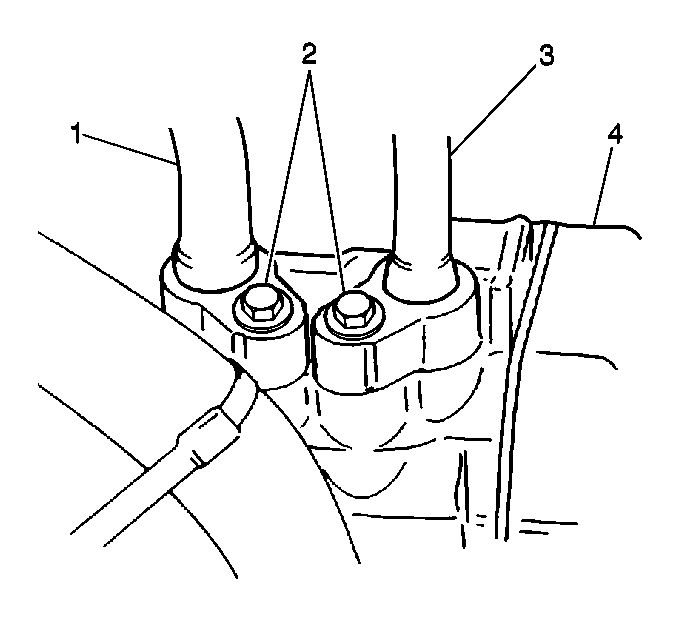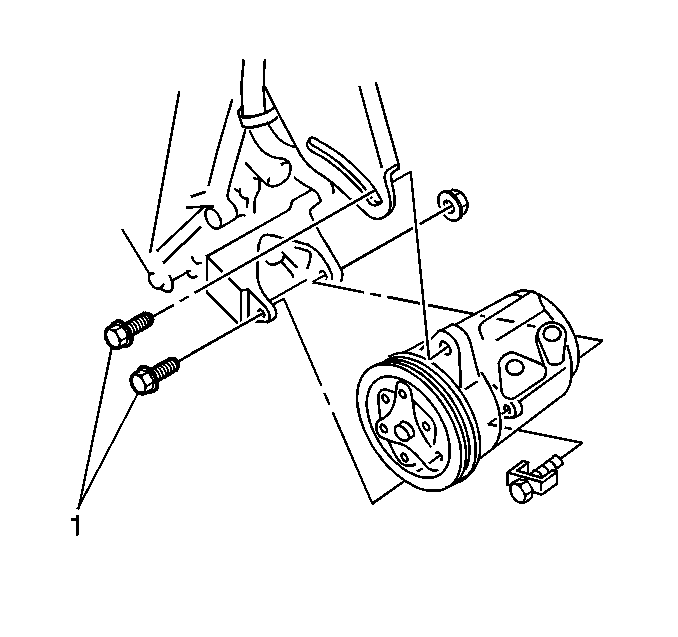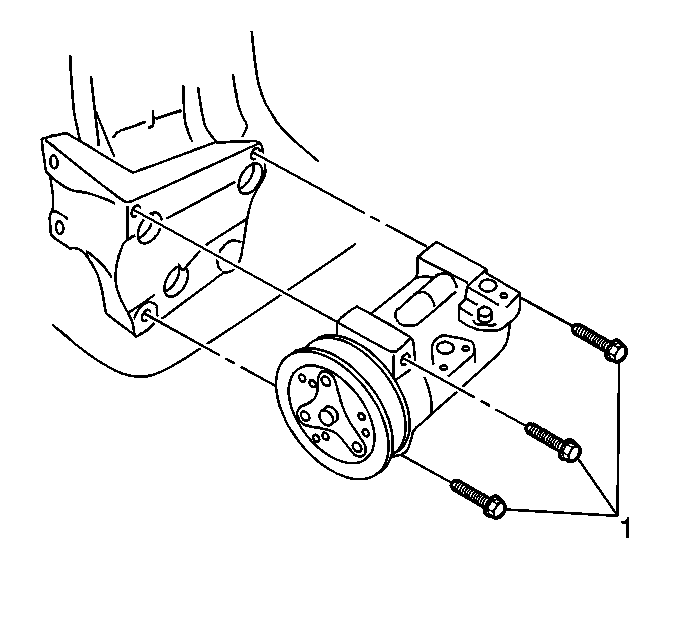Air Conditioning Compressor Replacement 1.6L
Removal Procedure
- Discharge and recover the refrigerant. Refer to Refrigerant Recovery and Recharging .
- Disconnect the negative battery cable.
- Remove 1 bolt (2) and the suction hose (1) from the compressor.
- Remove 1 bolt (2) and the discharge hose (3) from the compressor.
- Discard the O-rings.
- Cap all of the refrigerant line openings in order to keep out dirt and moisture.
- Disconnect the compressor clutch electrical connector.
- Remove the compressor upper mounting bolt (1).
- Remove the compressor lower mounting bolt.
- Remove the compressor lower mounting nut and bolt.
- Remove the compressor from the vehicle, while disengaging the compressor drive belt from the compressor clutch pulley.
Important: When replacing the compressor, drain the oil and measure the amount. Add this amount when installing a new compressor. New compressors are shipped with 120 ml (4.0 fl oz) of oil. Drain oil from the new compressor as necessary in order to ensure that the removed amount of oil and the added amount of oil are equal.
Caution: Unless directed otherwise, the ignition and start switch must be in the OFF or LOCK position, and all electrical loads must be OFF before servicing any electrical component. Disconnect the negative battery cable to prevent an electrical spark should a tool or equipment come in contact with an exposed electrical terminal. Failure to follow these precautions may result in personal injury and/or damage to the vehicle or its components.


Installation Procedure
- Install the compressor to the vehicle, while engaging the compressor drive belt to the compressor clutch pulley.
- Install the compressor upper mounting bolt (1).
- Install the compressor lower mounting bolt.
- Install the compressor lower mounting nut and bolt.
- Adjust the belt tension. Refer to Drive Belt Replacement in Engine Mechanical - 1.6L.
- Coat new discharge and suction hose O-rings with mineral base 525 viscosity refrigerant oil.
- Connect the discharge and the suction hoses to the compressor. Secure with two bolts (2).
- Connect the compressor clutch electrical connector.
- Connect the negative battery cable.
- Evacuate and recharge the air conditioning system. Refer to Refrigerant Recovery and Recharging .
- Operate the A/C system and test for refrigerant leaks. Refer to Leak Testing .

Notice: Use the correct fastener in the correct location. Replacement fasteners must be the correct part number for that application. Fasteners requiring replacement or fasteners requiring the use of thread locking compound or sealant are identified in the service procedure. Do not use paints, lubricants, or corrosion inhibitors on fasteners or fastener joint surfaces unless specified. These coatings affect fastener torque and joint clamping force and may damage the fastener. Use the correct tightening sequence and specifications when installing fasteners in order to avoid damage to parts and systems.
Tighten
Tighten the compressor mounting bolts to 23 N·m (17 lb ft).

Tighten
Tighten the compressor discharge and suction hose bolts to 35 N·m
(26 lb in).
Air Conditioning Compressor Replacement 2.0L
Removal Procedure
- Discharge and recover the refrigerant. Refer to Refrigerant Recovery and Recharging .
- Disconnect the negative battery cable.
- Remove 1 bolt (2) and the suction hose (1) from the compressor.
- Remove 1 bolt (2) and the discharge hose (3) from the compressor.
- Discard the O-rings.
- Cap all of the refrigerant line openings in order to keep out dirt and moisture.
- Disconnect the compressor clutch electrical connector.
- Remove the compressor drive belt from the compressor pulley. Refer to Generator and Air Conditioning Compressor and Power Steering Pump Belt Replacement in Engine Mechanical.
- Remove the 3 compressor mounting bolts (1).
- Remove the compressor from the vehicle.
Important: When replacing the compressor, drain the oil and measure the amount. Add this amount when installing a new compressor. New compressors are shipped with 120 ml (4.0 fl oz) of oil. Drain oil from the new compressor as necessary in order to ensure that the removed amount of oil and the added amount of oil are equal.
Caution: Unless directed otherwise, the ignition and start switch must be in the OFF or LOCK position, and all electrical loads must be OFF before servicing any electrical component. Disconnect the negative battery cable to prevent an electrical spark should a tool or equipment come in contact with an exposed electrical terminal. Failure to follow these precautions may result in personal injury and/or damage to the vehicle or its components.


Installation Procedure
- Install the compressor to the vehicle. Secure the compressor with the 3 bolts (1).
- Coat new discharge and suction hose O-rings with mineral base 525 viscosity refrigerant oil.
- Connect the discharge and the suction hoses to the compressor. Secure with two bolts (2).
- Connect the compressor clutch electrical connector.
- Install the compressor drive belt. Refer to Generator and Air Conditioning Compressor and Power Steering Pump Belt Replacement in Engine Mechanical.
- Connect the negative battery cable.
- Evacuate and recharge the air conditioning system. Refer to Refrigerant Recovery and Recharging .
- Operate the A/C system and test for refrigerant leaks. Refer to Leak Testing .

Notice: Use the correct fastener in the correct location. Replacement fasteners must be the correct part number for that application. Fasteners requiring replacement or fasteners requiring the use of thread locking compound or sealant are identified in the service procedure. Do not use paints, lubricants, or corrosion inhibitors on fasteners or fastener joint surfaces unless specified. These coatings affect fastener torque and joint clamping force and may damage the fastener. Use the correct tightening sequence and specifications when installing fasteners in order to avoid damage to parts and systems.
Tighten
Tighten the compressor mounting bolts to 23 N·m (17 lb ft).

Tighten
Tighten the compressor discharge and suction hose bolts to 35 N·m
(26 lb ft).
Air Conditioning Compressor Replacement 2.5L
Removal Procedure
- Discharge and recover the refrigerant. Refer to Refrigerant Recovery and Recharging .
- Disconnect the negative battery cable.
- Disconnect the power steering Pressure switch connector.
- Remove the 3 bolts from the power steering pump and position out of the way.
- Remove 1 bolt (2) and the suction hose (1) from the compressor.
- Remove 1 bolt (2) and the discharge hose (3) from the compressor.
- Discard the O-rings.
- Cap all of the refrigerant line openings in order to keep out dirt and moisture.
- Disconnect the compressor clutch electrical connector.
- Remove the compressor drive belt from the compressor pulley. Refer to Drive Belt Replacement - Air Conditioning Compressor and Power Steering in Engine Mechanical.
- Remove the 3 compressor mounting bolts (1).
- Remove the compressor from the vehicle.
Important: When replacing the compressor, drain the oil and measure the amount. Add this amount when installing a new compressor. New compressors are shipped with 120 ml (4.0 fl oz) of oil. Drain oil from the new compressor as necessary in order to ensure that the removed amount of oil and the added amount of oil are equal.
Caution: Unless directed otherwise, the ignition and start switch must be in the OFF or LOCK position, and all electrical loads must be OFF before servicing any electrical component. Disconnect the negative battery cable to prevent an electrical spark should a tool or equipment come in contact with an exposed electrical terminal. Failure to follow these precautions may result in personal injury and/or damage to the vehicle or its components.


Installation Procedure
- Install the compressor to the vehicle. Secure the compressor with the 3 bolts (1).
- Coat new discharge and suction hose O-rings with mineral base 525 viscosity refrigerant oil.
- Connect the discharge and the suction hoses to the compressor. Secure with two bolts (2).
- Connect the compressor clutch electrical connector.
- Install the power steering pump and secure with the 3 bolts.
- Connect the power steering Pressure switch connector.
- Install the compressor drive belt. Refer to Drive Belt Replacement - Air Conditioning Compressor and Power Steering in Engine Mechanical.
- Connect the negative battery cable.
- Evacuate and recharge the air conditioning system. Refer to Refrigerant Recovery and Recharging .
- Operate the A/C system and test for refrigerant leaks. Refer to Leak Testing .

Notice: Use the correct fastener in the correct location. Replacement fasteners must be the correct part number for that application. Fasteners requiring replacement or fasteners requiring the use of thread locking compound or sealant are identified in the service procedure. Do not use paints, lubricants, or corrosion inhibitors on fasteners or fastener joint surfaces unless specified. These coatings affect fastener torque and joint clamping force and may damage the fastener. Use the correct tightening sequence and specifications when installing fasteners in order to avoid damage to parts and systems.
Tighten
Tighten the compressor mounting bolts to 23 N·m (17 lb ft).

Tighten
Tighten the compressor discharge and suction hose bolts to 35 N·m
(26 lb ft).
Tighten
Tighten the power steering pump bolts to 25 N·m (18.5 lb ft).
